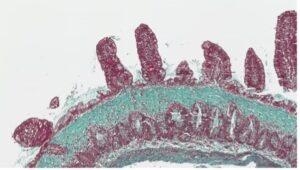Our current research in gastrointestinal, dental and endocrine diseases
Explore more PetSavers-funded research in other disease areas
 |
Investigating the role of thymosin beta 10 in feline chronic kidney diseasePhD Studentship (partial funding): £80,000 awarded in 2024 Institution: RVC Lead researcher: Elisavet Vasilopoulou Student: Sophie Broughton Chronic kidney disease (CKD) in cats is extremely common, and is the most frequent cause of death in cats over five years of age. Thymosin beta 10 (TB10) levels are elevated with kidney disease progression in cats, but its role in feline CKD is unknown. Aim: This PhD studentship will evaluate the utility of TB10 as a biomarker of CKD progression and elucidate its function in disease pathophysiology.
|
|
|
Blood adipokine and ghrelin concentrations in cats with chronically treated diabetes mellitus and with diabetes and hypersomatotropism undergoing hypophysectomyClinical Research Project Grant (joint-funded with the Small Animal Medicine Society): £9,940 awarded in 2023 Institution: RVC Lead researcher: Chris Scudder Cats undergoing pituitary gland excision for diseases such as acromegaly or hypersomatotropism often become obese. Aim: This study aims to understand the cause of this weight gain which may reflect changes in hormone levels, and could lead to the development of targeted treatment and the prevention of obesity and insulin resistance. |
|
|
Assessing the effect of D-mannose on clinical outcome and microbiota composition in canine chronic inflammatory enteropathyClinical Research Project Grant: £9,409.36 awarded in 2022 Institution: University of Edinburgh Lead researcher: Silke Salavati Chronic inflammatory enteropathy in dogs is difficult to treat as gut microbial dysbiosis is likely. Mannose has unique properties in binding specific bacteria in the gut before they can contribute to gut inflammation, and could be an easy and cheap way to help regulate dysbiosis long-term. Aim: This study will investigate whether mannose is an effective treatment for canine chronic inflammatory enteropathy, and examine its effect on the microbiota composition. |
Our past research in gastrointestinal, dental and endocrine diseases
|
|
Feasibility of using a point-of-care analyser for faecal calprotectin to differentiate different intestinal disease in catsStudent Research Project Grant: £2890 awarded in 2022 Institution: University of Edinburgh Lead researcher: Silke Salavati Student: Holly Grenville Inflammatory bowel disease (IBD) and lymphoma are the two most common chronic conditions in the feline gut, yet their diagnosis is complex and often requires invasive tests like intestinal biopsies. Faecal calprotectin (fCal) is commonly used in people and, more recently, in dogs with IBD as a marker of intestinal inflammation. Preliminary data suggest that it can also be used in cats, and can be measured with a point-of-care analyser, which facilitates real-time decision making in a clinical setting. This undergraduate project assessed the performance of a fCAL point-of-care analyser to differentiate cats with intestinal diseases from healthy cats. Take home message: The fCAL detection threshold of the point-of-care analyser was insufficient to produce readings, even at higher sample loading volumes, so could not be used to differentiate between cats with and without disease. Holly presented these findings as an abstract at BSAVA Congress 2023, which can be read here. A recording is freely available (skip to 0:51:24). |
|
|
The characterisation and clinical significance of intestinal fibrosis in cats with chronic inflammatory enteropathyMaster’s Degree by Research Grant: £40,000 awarded in 2021 Institution: RVC Lead researcher: Aarti Kathrani Student: Yuvani Bandara Feline chronic inflammatory enteropathy is a debilitating disease, which can ultimately result in euthanasia. Its exact cause is unknown and therefore treatment is a sequential or combination approach with diet, antibiotics and immunosuppressive medication depending on the severity of signs. Although fibrosis is routinely reported in intestinal biopsies from cats with chronic inflammatory enteropathy, its clinical significance is unknown so was explored in this master’s degree. Sixty-five cats with chronic inflammatory enteropathy were included in the study, with follow-up information available for 54 cats (83%). Of these, 37% (n=20) were euthanised due to gastrointestinal disease and 46% (n=25) were alive and in clinical remission, with 64% (n=16) of these diagnosed with food-responsive enteropathy. Intestinal biopsy specimens from these cats were stained with Masson’s trichrome stain and antivimentin and anticollagen I antibodies to identify intestinal fibrosis. Mucosal fibrosis was identified in 51% of duodenal and 76% of colonic hematoxylin and eosin-stained specimens. Vimentin labeling and Masson’s trichome staining identified additional cases of intestinal fibrosis in 65% and 58% of the duodenal biopsy specimens, respectively. Vimentin labeling detected intestinal fibrosis in 79% of the colonic biopsy specimens. Positive vimentin labeling and Masson’s trichrome staining of the colonic mucosa were associated with a decreased likelihood of attaining clinical remission and increased risk of death because of chronic inflammatory enteropathy (p < 0.05). Take home message: Additional staining at biopsy seems to allow for better identification of intestinal fibrosis and prognostic information compared to routine hematoxylin and eosin staining. These findings are published in the April 2023 issue of the Journal of Veterinary Internal Medicine. The study found no correlation between the tested clinicopathological variables, measured at the time of histopathological diagnosis, and death due to gastrointestinal disease, or length of survival in these cats before death due to gastrointestinal disease. However, achieving clinical remission reduced the likelihood of subsequent death due to gastrointestinal disease. These findings are published in the March 2023 issue of the Journal of Small Animal Practice. Our press release about the work can be read here. |
|
|
An investigation of novel immunohistochemical markers and serum auto-antibodies in cats with chronic biliary tract diseaseMaster’s Degree by Research Grant: £34,844 awarded in 2020 Institution: University of Cambridge Lead researcher: Penny Watson Student: Jason Bestwick Diseases of the bile ducts in cats are common but poorly understood: the causes are unknown and there is no universally effective treatment. Some cases may be due to the cat’s immune system attacking its own liver (autoimmune liver disease) but this has not been proven. This master’s degree aimed to improve our understanding and categorization of feline chronic liver disease by measuring serum autoantibodies in affected cats and correlating these with histopathology and immunochemistry findings. Take home message: Seven of the 34 cats analysed had serum autoantibodies that were detectable using indirect immunofluorescence and a species-specific substrate. This could allude to an immune-mediated aetiology and also the existence of multiple disease syndromes within the classically histologically-defined cholangitis/cholangiohepatitis complex in cats. An article about the study was published in BSAVA’s Companion magazine. |





